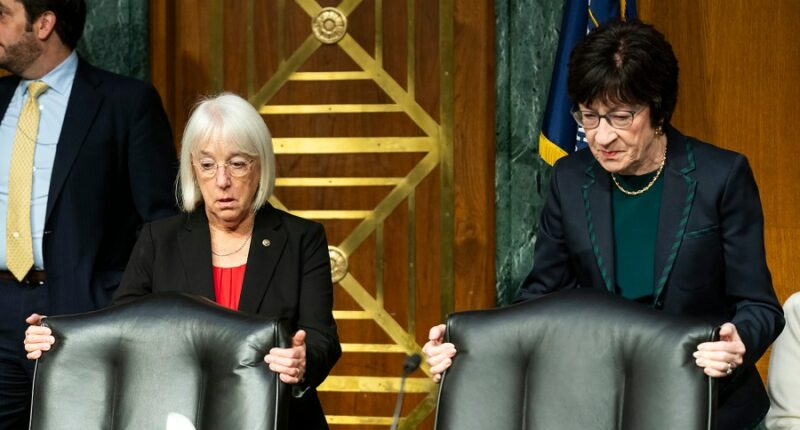Share this @internewscast.com

The Senate Appropriations Committee advanced legislation Thursday amounting to more than $1 trillion in government funding for fiscal 2026, ahead of a late September shutdown deadline.
The committee approved about $852 billion in discretionary funding for defense programs and roughly $200 billion in discretionary funding for the departments of Labor, Health and Human Services, and Education.
Overall, the panel has so far advanced eight out of the 12 annual funding bills for fiscal 2026, which begins Oct. 1.
Negotiators say the proposed defense funding would amount to an increase of about 3 percent above what President Trump requested earlier this year. That’s in addition to the $150 billion defense boost Republicans passed as part of a sweeping tax cuts and spending package to help advance the president’s agenda earlier this month.
“We can’t build a Golden Dome or restock our munitions or bring back American ship building without a sustained increased investment in all of our national defense, and we can’t treat reconciliation like a cure all,” Sen. Mitch McConnell (R-Ky.), who heads the subcommittee that crafted the Pentagon funding bill, said during Thursday’s committee meeting.
“I was glad to vote for the ‘one big, beautiful bill,’ but let’s not kid ourselves. It was not the additive defense spending some of us had hoped for,” he said.
The bill funds a 3.8 percent pay raise for service members and a 10 percent bump in pay for junior enlisted service members. The bill also provides $171 billion for the procurement of weapon systems, more than $140 billion for research and development, and about $303 billion aimed at the “sustainment of operations, weapons, training, and readiness activities,” according to the committee.
The panel also detailed increases across a number of items, including air and missile defense efforts, munitions, drone and counterdrone capabilities, and shipbuilding that includes $1.9 billion to fully fund Virginia-class subs.
The bill includes $500 million for Israel Cooperative Programs, which covers the Iron Dome, as well as $800 million for the Ukraine Security Assistance Initiative, which appropriators say was zeroed out in Trump’s budget request.
In the annual Labor and Health and Human Services (HHS) funding bill, negotiators were able to agree on about $50 billion in funding for the National Institutes of Health for biomedical investments in research, including billions for Alzheimer’s research and the National Cancer Institute, along with boosts for women’s and maternal health research.
The bill also includes about $12 billion for Head Start; $8.8 billion for the Child Care and Development Block Grant; more than $3 billion for State Opioid Response Grants and the Substance Use Prevention, Treatment and Recovery Services Block Grant; along with about $5.5 billion for mental health research, treatment and prevention.
“This bill also continues our bipartisan record by including a number of priorities from both sides of the aisle like, investments in America’s biomedical research, child care, education, mental and rural heath, and continued efforts to combat the opioid epidemic,” Sen. Shelley Moore Capito (R-W.Va.), who chairs the Labor, Health and Human Services, and Education Appropriations Subcommittee, said Thursday.
Sen. Tammy Baldwin (Wis.), the top Democrat on the subcommittee that crafted the bill, also told reporters ahead of the meeting that it would fully fund the suicide hotline.
“988, the suicide hotline is fully funded, including a $15 million increase for their operations,” Baldwin said. “We reject the Trump administration and RFK Jr.’s efforts to shut down SAMHSA, in which the 988, and other important mental health and substance use programs are housed,” she continued, referring to Robert F. Kennedy Jr., the Health and Human Services secretary.
Baldwin also said appropriators were “tightening” language requirements “that staffing levels at the Department of Education need to be sufficient to meet their missions and that they cannot outsource some of their key missions to other agencies or departments.”
However, senators noted Thursday that the appropriations bill does not include funding for the Corporation for Public Broadcasting, after Republicans successfully clawed back more than $1 billion in previously approved funding earlier this month.
Many Republicans have strongly defended the cuts, while singling out NPR and PBS, which have received funding from the corporation, for what they perceive as political bias.
“One thing this bill does not do, unfortunately, is fund the Corporation for Public Broadcasting. As everyone knows, Republicans rescinded bipartisan funding we provided for CPB in the first ever partisan rescissions package,” Sen. Patty Murray (Wash.), the top Democrat on the Senate Appropriations Committee, said Thursday.
“It is a shameful reality, and now communities across the country will suffer the consequences as over 1,500 stations lose critical funding,” she said, adding she hopes “Republicans will join us to restore this funding down the line.”
Baldwin also said during the markup that she believes “there is a path forward to fix this before there are devastating consequences for public radio and television stations across the country.”
“This cut to local public radio will fall hardest on those in rural areas and stations like WOJB and the North Woods of Wisconsin that the Corporation for Public Broadcasting supports, the infrastructure and systems that support local radio and stations, without it, these stations will close,” she said.
Some Republicans have also raised concerns over the cuts.
“I did vote to move the Labor-HHS bill out of the committee today, even though I have deep concerns about where we are right now,” Sen. Lisa Murkowski (R-Alaska), a spending cardinal, said Thursday. She acknowledged efforts by Sen. Mike Rounds (R-S.D.) to secure an agreement with the administration aimed at shielding tribal stations from the cuts, but she said she still has questions about the effort.
“We’re working with the administration, we’re working with the Alaska Public Media folks to ensure that our stations can receive this,” she said. “But I come from a state where we have half the tribes in the United States of America and of our 26 public radio stations, less than half of them are considered to be tribally owned or serving tribal land.”
Both the House and Senate are well behind on hashing out their annual funding work, as Trump’s “big, beautiful bill” of tax priorities dominated Washington’s attention over the past few months.
Senators are pushing to pass their first batch of funding bills across the floor as early as this week, as the chamber prepares to join the House in recess for August.
The House has so far only passed two of its annual funding bills, while the Senate has yet to pass any.
Senate Appropriations Committee Chair Susan Collins (R-Maine) said at the close of the meeting Thursday that the committee “does plan to continue on a dual track, advancing bills on the floor and through this committee.”













